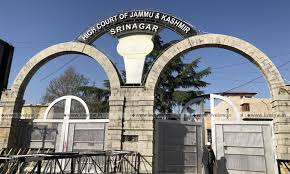‘Individual liberty must give way to national interest’: J&K High Court dismisses Doda resident’s habeas corpus petition

The Jammu and Kashmir High Court recently rejected a habeas corpus petition filed by a resident of Doda district. The man had challenged his detention under the J&K Public Safety Act (PSA), 1978. The court ruled that national interest outweighs personal liberty in cases where security is at risk.
Doda Resident Challenges Detention
The petitioner, a Doda local, had been detained under the PSA. His legal team argued that the detention order lacked valid reasoning. They claimed the authorities used outdated information and failed to follow due process.
His lawyers said the government didn’t provide specific details about the charges. They added that the detainee wasn’t given a fair chance to defend himself. The petition stressed that the detention violated Article 21 of the Indian Constitution, which protects the right to life and liberty.
Court Prioritizes National Security
The court did not agree with the petitioner’s claims. It ruled that the right to personal freedom is not absolute. If national security is at stake, the state has the power to restrict individual rights.
“Individual liberty must give way to the interests of national security and public order when the situation demands it,” the judgment stated.
The bench explained that preventive detention laws are strict but necessary. They help deal with exceptional circumstances, especially in conflict-prone areas like Jammu and Kashmir.
Why the Court Upheld the Detention
The judges said they had reviewed the grounds for detention. Although the state didn’t reveal every detail, it provided enough justification. The court concluded that the person’s activities posed a serious threat.
The ruling also mentioned that the law permits limited disclosure in matters involving security. The court felt the authorities acted within legal bounds.
Preventive Detention: A Controversial Tool
The PSA allows the government to hold someone without formal charges for up to two years. Human rights groups say the law is often misused. Critics believe it suppresses dissent, especially in regions with political tension.
Since the abrogation of Article 370 in 2019, Kashmir has seen more preventive detentions. Political leaders, students, and activists have often been held under this law. Many of them faced detention without trial or clear evidence.
Despite criticism, officials defend the PSA. They argue it helps prevent unrest and protects public order. According to the government, the law targets individuals who promote violence or aid terrorism.
What the Constitution Says
India’s Constitution allows preventive detention under Article 22, but with limits. Authorities must inform the detainee of the reason for arrest. The individual must also have a chance to challenge the detention.
However, special laws like the PSA offer more power to the state. These laws allow the government to delay or limit disclosure of reasons in the name of national interest.
The Supreme Court of India has often warned against the misuse of such laws. It has said that courts must check whether the detention is based on valid and fresh evidence.
In this case, the High Court gave the benefit of doubt to the state. It accepted the government’s claim that the man’s actions posed a security threat.
Legal Experts React
Lawyers and civil rights groups have expressed concern. They fear courts are becoming more lenient towards state actions, especially in Jammu and Kashmir.
Some believe this trend could weaken civil liberties. Others argue that it’s necessary, given the region’s history of violence and unrest.
Legal expert Faizan Mir said, “Courts must maintain balance. They must not allow the state to act without accountability. At the same time, they must not ignore real threats.”
Public Opinion Remains Divided
The ruling triggered mixed reactions. Supporters believe national security must come first. They argue that authorities need strong tools to protect peace.
However, many worry about the misuse of such powers. They point out that vague reasons and long detentions can erode trust in the system.
Some residents in Doda and nearby areas said the ruling reflects the harsh reality of life in Jammu and Kashmir. “We live under constant fear,” said a local student. “Even a small misunderstanding can land you in jail for months.”
Conclusion: Liberty at a Crossroads
The J&K High Court’s ruling adds to a growing list of judgments where national interest trumps personal liberty. It shows the judiciary’s cautious approach in sensitive regions like Kashmir.
The court stressed the need to protect public order. But the case also highlights the risk of denying justice without fair trials.
As India continues to face internal security challenges, the line between protection and overreach remains thin. Courts and lawmakers must work together to ensure freedom and safety go hand in hand.






